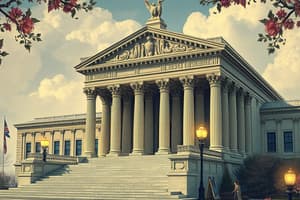Podcast
Questions and Answers
What is the main difference between federal and confederal systems of government?
What is the main difference between federal and confederal systems of government?
In a federal system there is centralized authority, while in a confederal system power is distributed equally among the states.
Why did direct democracy work for the ancient Greek city of Athens?
Why did direct democracy work for the ancient Greek city of Athens?
Athens had a small population.
The best explanation as to why direct democracy would not work well in the United States is that
The best explanation as to why direct democracy would not work well in the United States is that
NOT voting is not mandatory in the United States.
Central and state governments influence each other in
Central and state governments influence each other in
Which statement best defines a communist government?
Which statement best defines a communist government?
In which system of government would states function independently of each other?
In which system of government would states function independently of each other?
The two forms of democracy are?
The two forms of democracy are?
In an autocracy, what kind of power does the leader hold?
In an autocracy, what kind of power does the leader hold?
In the modern world, many countries with kings or queens have evolved into constitutional democracies. In these countries, monarchs are mostly?
In the modern world, many countries with kings or queens have evolved into constitutional democracies. In these countries, monarchs are mostly?
In a parliamentary system of representative democracy, the prime minister?
In a parliamentary system of representative democracy, the prime minister?
Study Notes
Federal vs. Confederal Systems
- Federal systems feature centralized authority, where power is shared between national and state governments.
- Confederal systems distribute power equally among states, with less centralized control.
Direct Democracy in Ancient Athens
- Direct democracy thrived in Athens due to its small population, enabling widespread participation.
Challenges of Direct Democracy in the U.S.
- Direct democracy is impractical in the U.S. primarily because voting is not mandatory, leading to low engagement.
Government Interactions
- Central and state governments interact and influence each other in systems other than a confederal arrangement.
Understanding Communist Governments
- A clear definition of a communist government revolves around the collective ownership of resources and centralized control.
Independent State Functionality
- In certain government systems, states operate independently of one another, unlike in federal frameworks.
Forms of Democracy
- The two primary forms of democracy are direct democracy, where citizens vote on policies directly, and representative democracy, where elected officials make decisions on behalf of the populace.
Power Dynamics in Autocracies
- In an autocracy, the leader possesses all governing power, often making unilateral decisions without public input.
Role of Monarchs in Constitutional Democracies
- In modern constitutional democracies, monarchs often serve as figureheads with limited powers, primarily performing ceremonial duties.
Parliamentary System Dynamics
- In a parliamentary system, the prime minister is appointed by the monarch, demonstrating the interplay between monarchy and elected officials.
Studying That Suits You
Use AI to generate personalized quizzes and flashcards to suit your learning preferences.
Description
This quiz explores the fundamental differences between federal and confederal systems of governance, detailing how authority is distributed. It also touches on the functioning of direct democracy in ancient Athens. Test your knowledge on these governance structures!




